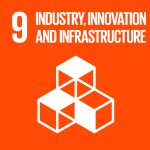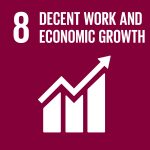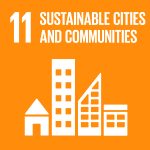Esta web utiliza cookies para que podamos ofrecerte la mejor experiencia de usuario posible. La información de las cookies se almacena en tu navegador y realiza funciones tales como reconocerte cuando vuelves a nuestra web o ayudar a nuestro equipo a comprender qué secciones de la web encuentras más interesantes y útiles.
The SDG Undergraduate Research Group: Undergraduate Leadership in the UN Sustainable Development Goals
Description
Institution
University of California, Berkeley

Organizations/areas of the university involved
The SDG Undergraduate Research Group; UC Berkeley Office of Sustainability
Country
UNITED STATES
The SDG Undergraduate Research Group (SURG) is an undergraduate-led learning and leadership group affiliated with the UC Berkeley Office of Sustainability and motivated by the United Nations Sustainable Development Goals.
Through student-led advocacy and leadership opportunities, SURG aims to take on sustainability-oriented action on the major challenges of our time, expand undergraduate leadership, and increase transdisciplinary learning. SURG democratizes leadership opportunities, providing a space for underclass folks to participate in living lab co-curricular experience with the UN SDGs. SURG was established in the Fall 2020 Semester and has gained considerable interest from undergraduates and faculty across campus departments – growing to a 33-student group within two semesters. SURG has developed a strong culture among our existing community, hosting frequent socials and all-team check-ins. Despite the challenges of starting and running a student organization under the pandemic, we have been able to have a tangible impact on our members’ college experiences.
Each academic semester, SURG is divided into several committees, each addressing one or more topics of sustainability regarding the UC Berkeley campus and the surrounding community. Students work with mentors (UC Berkeley faculty and industry professionals) on projects that support, inform, and/or advocate for the progress of the UN SDGs and sustainability action on and off campus. Previous projects include an economic analysis of the effect of the COVID-19 pandemic on small businesses in and around Berkeley and another included producing a report for the University that analyzed its curriculum’s role in advancing the SDGs. Ongoing projects include addressing campus wildfire vulnerability, understanding public transportation and accessibility in the Bay Area, and the University’s role in microplastics production in the San Francisco Bay. Additionally, SURG’s Environmental Justice (EJ) group is partnering with the UC Berkeley Office of Sustainability to draft recommendations to UC Berkeley’s Sustainability Report on how EJ can be better centered at our University.
Moving forward, SURG aims to expand leadership by giving opportunities to all students to make organization-wide decisions, spearhead their own projects, and collaborate with key stakeholders. As an organization aimed around democratizing undergraduate leadership, it is important that we are able to meet the needs of a wide variety of students who would have otherwise not had these opportunities due to financial concerns.
Results and impact measured or expected
We measure the sustainability benefits of our efforts through campus and community engagement. Our primary goal is outreach/engagement; and our primary metric is the number of individuals, campus departments, and organizations we are able to reach and support with our work; including, but not limited to: undergraduate students and key stakeholders from the UC Berkeley community or City of Berkeley. With five students per committee, and five committees each semester, SURG has at least 25 members per semester – with a combination of returning and new members. Our main event per semester is our research symposium – which has drawn visitors from various departments on campus, sustainability-oriented offices across the U.S, and the general public. We also gauge our level of engagement with various forms of communications (i.e. website, newsletters, and social media that highlight SURG’s work). In all, our posts and events have reached hundreds of individuals.
Connection with the SDG framework
SURG’s mission is advancing the UN SDGs on and off the UC Berkeley campus through student engagement and research. SURG undergraduate student researchers undergo training on the UN SDGs, before developing research projects that advocate and advance the UN SDGs. Previous projects include an economic analysis of the effect of the COVID-19 pandemic on businesses in Berkeley ( SDG 8) and another included producing a report for the University that analyzed its curriculum’s role in advancing the SDGs. Ongoing projects include addressing campus wildfire vulnerability (SDG 11) and understanding public transportation and accessibility in the Bay Area (SDG 9). Additionally, SURG’s Environmental Justice (EJ) group is partnering with the UC Berkeley Office of Sustainability to draft recommendations to UC Berkeley’s Sustainability Report. Some of our teams are also working with the Global University Climate Forum and their work will be featured in the 26th UN Conference of the Parties (COP 26).
Barriers and follow up
SURG was founded in August 2020, months into the Covid-19 Pandemic. Because of this, the organization has been operating remotely and across multiple locations and timezones (as some students are currently overseas). Despite the lack of in-person engagement and time differences, we have been able to create tangible impacts on campus and our members’ experiences. Careful planning and logistical flexibility enabled the organization to group those with similar schedules and timezones on the same projects. Additionally, we employed the use of virtual communications platforms such as ‘Slack’ to organize and communicate upcoming events, deadlines, and other information as smoothly as possible. For live virtual events – such as our end-of-semester research symposium – we utilized a multimedia format, with students who could not attend the events (due to time zone differences) recording their presentations, written research reports, and live virtual presentations.
Transferability of the initiative
The SURG model is both easily scalable and transferable. The primary aspects of SURG are its SDG Research Committees, which bring together like-minded individuals in researching and discussing one or more of the UN SDGs. This has been done on the undergraduate level, but can easily be expanded to include graduate students, university faculty/staff, or industry professionals. Moreover, the SURG model can also be transferred across higher education institutions so long as there are like-minded and sustainability-oriented individuals who are willing to take the initiative to establish such an institution at their own universities. One of SURG’s founding visions is to eventually establish a network of SURG or SURG-adjacent organizations across the world to promote international cooperation toward the SDGs and so that organizations may learn from one another; so we hope that this initiative will be transferred to other universities.
Education 4 SDG funciona gracias a WordPress





